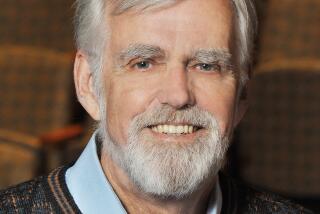Review: Benjamin Britten’s ‘Curlew River’ flows well in Santa Monica

- Share via
Jacaranda, the Santa Monica new music series, began its current season in September with a significant contribution to the local ad hoc celebrations of the 100th anniversary of John Cage’s birth that month. It is now ending the season with a significant contribution to “Britten 100/LA,” the citywide festival celebrating the 100th anniversary of Benjamin Britten’s birth later this year. These are not obvious bookends.
There is little to connect the composers — one a leader of the American avant-garde, the other the first British composer to accept a life peerage — who had no regard for each other, musically or otherwise. As his country’s most renowned composer, an often angst-ridden Britten often attempted to write scores about outsiders for insiders, namely the musical establishment. Cage remained a contented outsider who took the commonality of things as his starting point.
There was, however, one curious similarity. Both composers visited Japan (Britten in 1956, Cage in 1962), and its culture made a significant and lasting impression on their music. Late in life each turned to the project of writing operas inspired by Noh theater.
PHOTOS: Arts and culture in pictures by The Times
Cage, who died in 1992 and composed several Japanese-inspired scores, did not live to complete his “Noh-Opera,” which he proposed in 1988. But Britten, who died in 1976, did write “Curlew River” in 1964, based on the 14th century Noh drama “Sumida-gawa.” It proved to be his weirdest major score, verging in some aspects almost on Cagean indeterminacy. And it was, Saturday night in First Presbyterian Church, the convincing centerpiece of Jacaranda’s Britten festivities, which will conclude with a Britten concert on June 1.
A merging of seemingly incompatible traditions, “Curlew River” is, on the surface, an exercise in opposites attracting, a crossing of genres. In the Noh play, a madwoman reaches the Sumida River in search of her kidnapped child. She learns of his death from a boatman who ferries her across and shows her his grave. She invokes the Buddha, and her son’s phantom briefly appears.
Britten, who said he was haunted for years by the economy of style of the drama as well as the chanting speech and the strange instruments, remade “Sumida-gawa” as a medieval church parable play, the Sumida becoming the Curlew. He followed the story closely until the end, where he and his librettist, William Plomer, added a miracle. Soil from the boy’s grave has the power to cure the sick.
But while intended for a church setting — the 70-minute work begins with a procession of monks walking down the aisle chanting a Latin liturgical text — all of the characters are, as in Noh, sung by men. Britten wrote the role of the Madwoman for his partner, tenor Peter Pears, and that was, at the time of the premiere, controversial and some even thought risible. Seven instrumentalists are asked to play in highly inflected, Asian-influenced styles and remain as strong individuals, which is the score’s most Cagean quality. There is meant to be no conductor.
The sparseness and the strangeness are the greatest glory of “Curlew River.” Britten recognized that 14th century musics of the Western church and the Japanese Buddhist court become, centuries later, almost equally remote to us. The composer brought to “Curlew River,” moreover, his typical reserve and his exquisite polish, traits precisely suited for both traditions.
CHEAT SHEET: Spring Arts Preview
But Britten’s most original inspiration proved making the Madwoman a mad tenor. Madwomen in opera are commonplace enough to hardly seem outsiders. But there is something about a madman as madwoman that grabs our attention and, perhaps, our compassion. Assuming you can find a tenor who can pull it off.
Jacaranda found him. In a richly nuanced, boldly expressive but expressly avoiding cheap pathos performance, Steven Tharp, who has a broad operatic repertory, displayed the visionary quality of madness. He was well supported by an eloquent Ferryman (Dean Elzinga), a booming Abbot (Reid Bruton), a compassionate Traveler (Abdiel Gonzalez) and the Spirit of the Child (Drew Pickett), a boy soprano who sounded like an angel.
Jacaranda had originally meant for this to be a bolder theatrical offering but in the end could manage only an unobjectionable conventional staging by Michele Spears. Members of the Gay Men’s Chorus of Los Angeles and the seven-member Jacaranda Chamber Ensemble were not bold either but more conventionally supportive.
That may have given the performance a churchier and less Japanese “Curlew River” character than the more radical (Cagean even) recording of the opera made under the composer’s supervision. But the work has only once before been presented in Los Angeles (the Little Orchestra Society of New York brought it to Occidental College in 1968). The church was full with a devout new music audience, and a rare communal spirit was achieved. It was a moving, important occasion.
MORE
INTERACTIVE: Christopher Hawthorne’s On the Boulevards
CHEAT SHEET: Spring Arts Preview
PHOTOS: Arts and culture in pictures
More to Read
The biggest entertainment stories
Get our big stories about Hollywood, film, television, music, arts, culture and more right in your inbox as soon as they publish.
You may occasionally receive promotional content from the Los Angeles Times.











